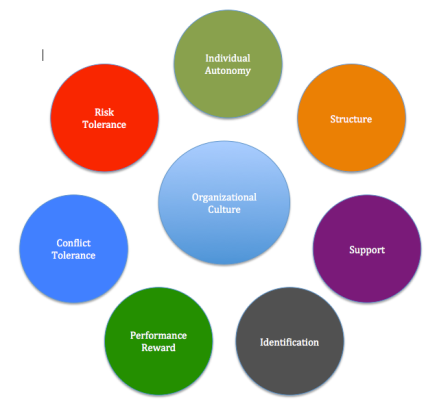Acting as a follow-up on the previous post, in this post I will discuss about how to use the seven key dimensions model to define an “appropriate” organizational culture for a particular company. A typical start-up software company will be discussed in this case due to the fact that this type of company is quite popular nowadays as well as I am very familiar with it.

The first rule of thumb to remember when defining an organizational culture is that it must be aligned with the company objectives and strategic plan. This acts as the main principle when defining the seven key dimensions of the organizational culture:
- Individual Autonomy: High. In a start-up company, each individual should have a high degree of responsibility and independence to get as much job done as possible. Empowerment should be encouraged and decision-making should be decentralized. To adapt quickly to the rapid changes of the market, more and more software companies apply agile methodologies such as Extreme Programming or Scrum. Those methodologies required self-managed and self-organized staffs and this can only be achieved with a high level go individual autonomy.
- Structure: Low. A flat organizational structure is strongly encouraged for a start-up software company. In addition, it should not have a lot of rules and policies, which may have bad impacts on the inspiration and creativity of its employees. In the software industry, creativity and ideas are the key factors to success.
- Support: High. In my opinion, high degree of assistance and warmth provided by managers to their subordinates is always a good thing in all company, not just a start-up software one.
- Identification: High. Similarly to the Support dimension, it is always good for an organization when its employees are proud of being part of it. A high level of Identification is also good for company branding.
- Performance Reward: High. In a start-up company, performance should be the main factor that affect such rewards as salary increase, bonus and promotion, not seniority or loyalty.
- Conflict Tolerance: High. Conflicts should be encouraged in a start-up software company, as long as they are related to work and they are not personal conflicts. High level of work-related conflicts can increase creativity and help to find the optimal solutions, which are vert important in the software industry.
- Risk Tolerance: High. Similar to the Conflict Tolerance dimension, a high level of Risk Tolerance provides more advantages than disadvantages to a software company. When taking risk is encouraged, it is more likely to find creative and optimal solutions in the software industry.
Once the key dimensions of the organizational culture have been defined, they can be “implemented” within the following artifacts:
- Mission statement, logo and slogan
- Policies and rules
- Reward system
- Organizational structure
- Physical layout of the office
- Recruitment process
- Orientation program for new employees
- Management and leadership style
Pingback: What define a startup? | Agile Vietnam
Pingback: Characteristics of an employee that a startup should hire | Agile Vietnam
Pingback: Understanding conflict at workplace | Agile Vietnam
Pingback: Empowerment in organizations | Agile Vietnam
Pingback: How “inappropriate” organizational culture may contribute to the failure of a startup | Agile Vietnam
Very great post. I just stumbled upon your blog and wished to mention that I’ve truly enjoyed browsing your weblog posts.
After all I will be subscribing in your feed and I hope you write once more soon!